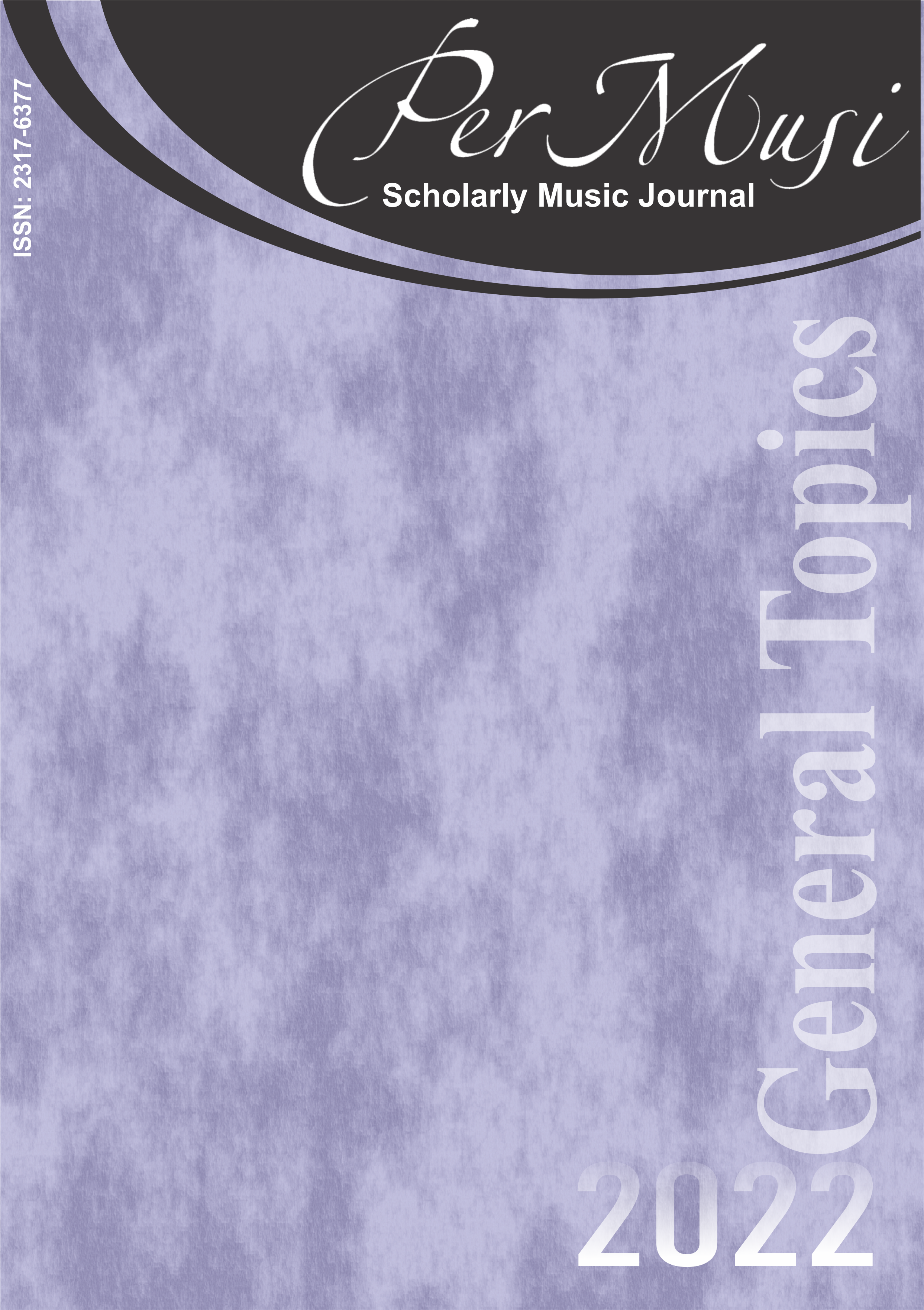Abordagem de tratamento musicoterapêutico em dependência química baseado no Modelo Transteórico de Mudança
DOI:
https://doi.org/10.35699/2317-6377.2022.36890Palavras-chave:
Musicoterapia, Dependência Química, Modelo Transteórico de MudançaResumo
O Modelo Transteórico de Mudança (MTM) foi criado por Prochaska e DiClemente em (1982), e sustenta trabalhos clínicos em Dependência Química desde sua origem a partir de Estágios de Mudança. O presente texto apresenta um rationale para tratamento musicoterapêutico em dependência química apoiado no Modelo Científico Racional de Mediação (Rational Scientific Mediating Model – R-SMM) em interfaces com o MTM. Assim, discutimos as bases neurofisiológicas do processamento musical bem como das drogas de abuso, apontamos as técnicas musicoterapêuticas já comprovadamente eficientes ao tratamento musicoterapêutica com tal população, apresentamos o MTM e, por fim, apontamos quais técnicas possuem mais eficiência para as diferentes fases do tratamento. Esta pesquisa servirá de sustentação para a criação de um instrumento de avaliação que informe se o processo musicoterapêutico auxilia na evolução de pacientes dependentes químicos.
Referências
Almeida, Priscila P.; Bressan, Rodrigo A.; Lacerda, Acioly L. 2017. Neurobiologia e neuroimagem dos comportamentos relacionados ao uso de substâncias psicoativas. In: Diehl, Alessandra; Cordeiro, Daniel; Laranjeira, Ronaldo. Dependência química: prevenção, tratamento e políticas públicas. Porto Alegre: Artmed, 2011: 35-42.
Bruscia, K. 2002. Definindo Musicoterapia. Rio de Janeiro: Enelivros.
Douglas, C.R. 2002. Tratado de fisiologia aplicada a fonoaudiologia. São Paulo: Robe Editorial.
Figueira, B. R. M. 2012. A utilização da música como estímulo reforçador pela Análise do Comportamento: uma breve revisão bibliográfica. Monografia. UFSCAR: São Carlos.
Garcia, Frederico D. 2014. Abordagem Integral do Paciente com Dependência Química. In: Garcia, Frederico Duarte (Org.). Manual de Abordagem de Dependências Químicas. Belo Horizonte: Utopika Editorial.
Garcia, F. Alkmin, N. R. 2014. Conceito de drogas e seus padrões de uso. In: Garcia, F. D. Manual de abordagens em Dependência Química. CRR em Drogas. Belo Horizonte, Utopila Editorial.
Hargreaves, David; Zimmerman, Marilyn. 2006. Teorias do desenvolvimento da aprendizagem musical. In: ILARI, Beatriz (org.). Em busca da mente musical: Ensaios sobre os processos cognitivos em música – da percepção à produção. Curitiba: Editora da UFPR: 231-270.
Hodges, D. 2000. Why are we musical? Support for an evolutionary theory of human musicality. In C. Woods, G. Luck, R. Brochard, F. Seddon, J. Sloboda (Eds.), Proceedings of the sixth International conference on music perception and cognition. Staffordshire: Keele University, Psychology Department.
Jaeger, Antônio; Rigoni, Maisa S.; Argimon, Irani, I. L. 2017. Avaliação Neuropsicológica na dependência química e suas interfaces com a motivação para mudança. In: Por que é tão difícil mudar? Contribuições do Modelo Transteórico de Mudança do comportamento na prática vlínica e na Promoção de Saúde. Novo Hamburgo: Sinopsys.
Lent, R. 2002. Cem bilhões de neurônios: conceitos fundamentais de neurociência. São Paulo: Ateneu
L'Etoile, Shannon K.; Dachinger , Carolyn; Fairfield, Joy; Lathroum, Linda. 2012. The Rational-Scientific Mediating Model (R-SMM): A Framework for Scientific Research in Music Therapy. In: Music Therapy Perspectives, 30; 2: 130–140, https://doi.org/10.1093/mtp/30.2.130. Acesso: 12/07/2021.
O’kelly, Julian; Fachner, Jörg; Tervaniemi, Mari. 2016. Editorial. In: O’kelly, Julian; Fachner, Jörg; Tervaniemi, Mari. Dialogues in Music Therapy and Music Neuroscience: Collaborative Understanding Driving Clinical Advances. Frontiers Media.
Oliveira, M. S,; Szupszynski, K. P. D. R.; Lucena-Santos, Paola; Freire, S. D.; Bitencourt, S.; Souza, C. D. 2017. Instrumentos de avaliação do Modelo Transteórico de Mudança. In: Por que é tão difícil mudar? Novo Hamburgo: Sinopsys.
Pedrosa; Garcia; Loureiro. 2021. Musicoterapia na Dependência Química: Uma Revisão Integrativa. Música Hodie. No prelo.
Rocha, V. C.; Boggio, P. S. 2013. A música por uma óptica neurocientífica. Belo Horizonte: Per Musi, 27: 132-140.
Senad. 2019. Neurobiologia: mecanismos de reforço e recompensa e os efeitos biológicos e os efeitos comuns às drogas de abuso. In: http://www.aberta.senad.gov.br/medias/original/201704/20170424-094615-001.pdf. Acesso 08/12/2019.
Sewak, Robert; Spielholz, Neil I. 2018. Relapse Prevention: Using Sound to Reduce the Probability of Recidivism and Suffering Following Detoxification. In: Medical Hypotheses. https://doi.org/10.1016/j.mehy.2018.06.023.
Silverman, M. J. 2015. Music Therapy in Mental Health for Illness Management and Recovery. New York, NY: Oxford University Press.
Sloboda, J. A. 2018. A mente musical: a psicologia cognitiva da música. Tradução: Beatriz Ilari e Rodolfo Ilari. Londrina: Eduel.
Stainsby, T.; Cross, I. 2016. The perception of pitch. In: Hallam, S.; Cross, I.; Thaut, M.. The Oxford handbook of music psychology. Oxford: Oxford University Press: 63 - 79.
Szupszynski, Karen Priscila del Rio. 2012. Estudo dos processos de mudança em usuários de substâncias psicoativas ilícitas. Tese. Porto Alegre: PUC/RS.
Tomaino, Concetta M. 2014. Musicoterapia neurológica: evocando as vozes do silêncio. EST: São Leopoldo.
Thaut, M. H. Toward a cognitive-affetive model in neuropsychiatric music therapy. 2005a. In: Unkefer, R.F., Thaut, M.H. (eds). Music therapy in the treatment of adults with mental disorders: theoretical bases and clinical interventions. Missouri: MMB Music Inc.: 86-99
Thaut, Michael. 2005b. Rhythm, Music, and the Brain: Scientific Foundation and Clinical Applications. New York: and London: Routledge Taylor & Francis Group.
Thaut, M. H. 2005c. The future of Music in Therapy and Medicine. In: Annals New York Academy Of Sciences. Nova york: 1060: 303–308.
Thaut, M. 2014. Neurologic Music Therapy: from social science to neuroscience. In: Thaut, M.; Hoemberg, V. Handbook of neurologic music therapy. Nova York: Oxford University Press.
Thaut, M.; Hoemberg, V. 2008. Handbook of neurologic music therapy. Nova York: Oxford University Press.
Velasquez, M., Maurer, G., Crouch, C., & DiClemente, C. 2001. Group treatment for substance abuse: a stages-of- change therapy manual. New York: The Guilford Press.
Zatorre, Robert J., SALIMPOOR, Valorie N. 2013. From perception to pleasure: Music and its neural substrates. In: PNAS, June v. 18: 110.
Zatorre, Robert. 2018. From Perception to Pleasure: How Music Changes the Brain. In: https://www.youtube.com/watch?v=KVX8j5s53Os. Acesso 12/07/2021.
Publicado
Edição
Seção
Licença
Copyright (c) 2022 Per Musi

Este trabalho está licenciado sob uma licença Creative Commons Attribution 4.0 International License.

Exceto onde está indicado, o conteúdo neste site está sob uma Licença Creative Commons - Atribuição 4.0 Internacional.












